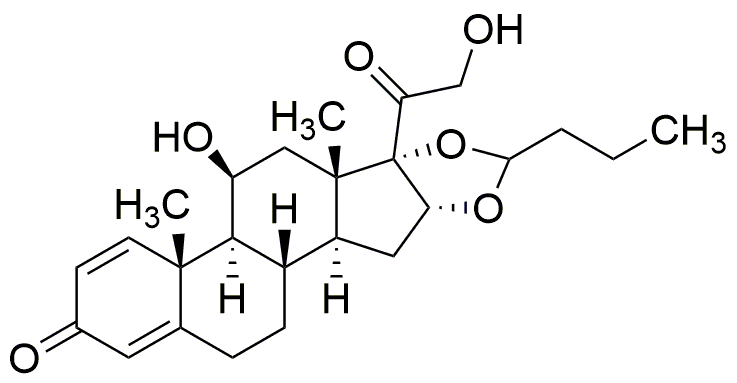Budesonide is widely utilized in research focused on:
- Respiratory Medicine: Commonly used as an inhaled corticosteroid to manage asthma and chronic obstructive pulmonary disease (COPD), helping to reduce inflammation and improve lung function.
- Gastroenterology: Effective in treating inflammatory bowel diseases such as Crohn's disease and ulcerative colitis, providing localized anti-inflammatory effects with fewer systemic side effects compared to other corticosteroids.
- Allergy Treatments: Employed in nasal sprays to alleviate allergic rhinitis symptoms, offering targeted relief with minimal systemic absorption.
- Dermatology: Used in topical formulations for skin conditions like eczema and psoriasis, helping to reduce inflammation and itching while being well-tolerated by patients.
- Clinical Research: Investigated for its potential in various therapeutic areas, including its immunomodulatory effects, which may benefit conditions beyond its current approved uses.
General Information
Properties
Safety and Regulations
Applications
Budesonide is widely utilized in research focused on:
- Respiratory Medicine: Commonly used as an inhaled corticosteroid to manage asthma and chronic obstructive pulmonary disease (COPD), helping to reduce inflammation and improve lung function.
- Gastroenterology: Effective in treating inflammatory bowel diseases such as Crohn's disease and ulcerative colitis, providing localized anti-inflammatory effects with fewer systemic side effects compared to other corticosteroids.
- Allergy Treatments: Employed in nasal sprays to alleviate allergic rhinitis symptoms, offering targeted relief with minimal systemic absorption.
- Dermatology: Used in topical formulations for skin conditions like eczema and psoriasis, helping to reduce inflammation and itching while being well-tolerated by patients.
- Clinical Research: Investigated for its potential in various therapeutic areas, including its immunomodulatory effects, which may benefit conditions beyond its current approved uses.
Documents
Safety Data Sheets (SDS)
The SDS provides comprehensive safety information on handling, storage, and disposal of the product.
Product Specification (PS)
The PS provides a comprehensive breakdown of the product’s properties, including chemical composition, physical state, purity, and storage requirements. It also details acceptable quality ranges and the product's intended applications.
Certificates of Analysis (COA)
Search for Certificates of Analysis (COA) by entering the products Lot Number. Lot and Batch Numbers can be found on a product’s label following the words ‘Lot’ or ‘Batch’.
Numéro de catalogue
Numéro de lot/série
Certificates Of Origin (COO)
This COO confirms the country where the product was manufactured, and also details the materials and components used in it and whether it is derived from natural, synthetic, or other specific sources. This certificate may be required for customs, trade, and regulatory compliance.
Numéro de catalogue
Numéro de lot/série
Safety Data Sheets (SDS)
The SDS provides comprehensive safety information on handling, storage, and disposal of the product.
DownloadProduct Specification (PS)
The PS provides a comprehensive breakdown of the product’s properties, including chemical composition, physical state, purity, and storage requirements. It also details acceptable quality ranges and the product's intended applications.
DownloadCertificates of Analysis (COA)
Search for Certificates of Analysis (COA) by entering the products Lot Number. Lot and Batch Numbers can be found on a product’s label following the words ‘Lot’ or ‘Batch’.
Numéro de catalogue
Numéro de lot/série
Certificates Of Origin (COO)
This COO confirms the country where the product was manufactured, and also details the materials and components used in it and whether it is derived from natural, synthetic, or other specific sources. This certificate may be required for customs, trade, and regulatory compliance.


